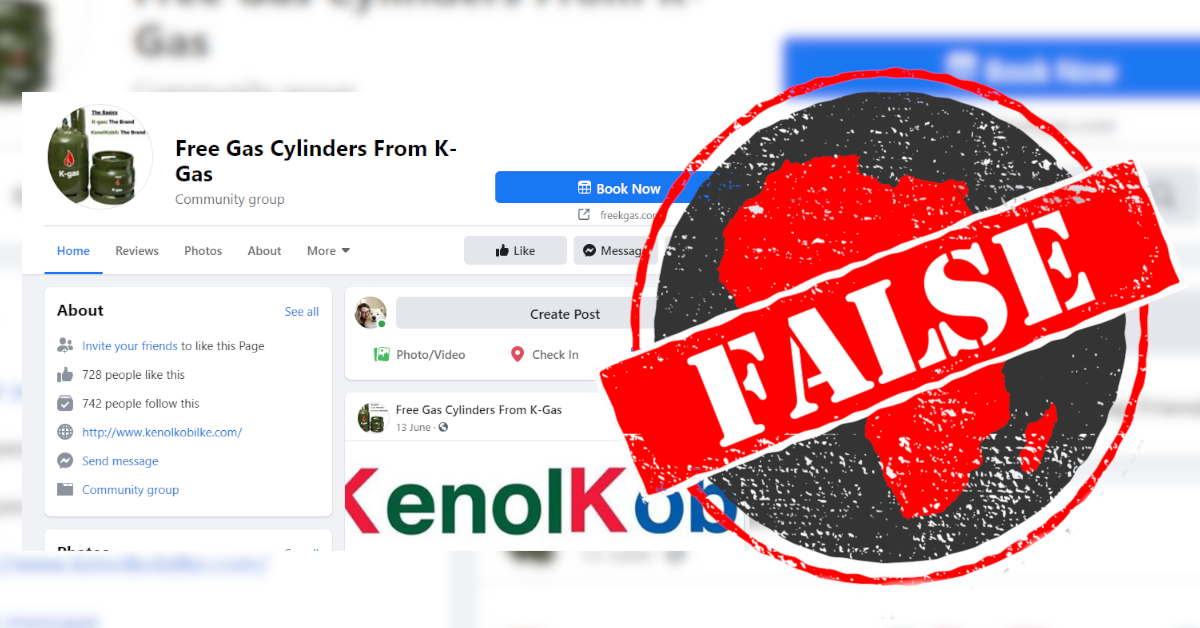The Facebook page “Free Gas Cylinders From K-Gas” is a scam.
It impersonates KenolKobil, a fuel marketing company based in Kenya. K-Gas is the company’s cooking gas offering, which it describes as its “brand of choice in Kenya”.
While Africa Check was working on this report, the page deleted all its posts. It now simply provides links to two WordPress blogs – http://freekgas.com and http://kenolkobilke.com – where people are invited to apply for free gas cylinders.
KenolKobil’s official website is https://www.kenolkobil.com. Websites that use “http” instead of “https” are less secure and put your device at risk of malware.

The scam is simple. The free gas cylinders come with a “booking fee”, to be paid via M-Pesa mobile money transfer. If you apply, you won’t get a free cylinder – and you will lose hundreds of shillings.
The “book here” page on both blogs has the same wording: “All applicants are required to pay a delivery fee of ksh 250 for the 6kg gas cylinders and Ksh 350 for the 13 kg gas cylinder.”
Using the inattentive writing typical of scammers, they then list the “registration procedure”:
In April 2020, KenolKobil posted a warning about this type of scam.
“Please beware of the below fake promotion,” the company said on Facebook. “K-Gas is not giving away free cylinders and the below page does not belong to us or any of our authorised K-Gas dealers.”
The fake Facebook page was set up in June 2020 and has about 700 followers. The official KenolKobil PLC Facebook page has more than 8,500 followers and was created nine years ago, in February 2011.
Africa Check has debunked this scam several times. To find out more, read our guide to Facebook scams and how to spot them. – Dancan Bwire
It impersonates KenolKobil, a fuel marketing company based in Kenya. K-Gas is the company’s cooking gas offering, which it describes as its “brand of choice in Kenya”.
While Africa Check was working on this report, the page deleted all its posts. It now simply provides links to two WordPress blogs – http://freekgas.com and http://kenolkobilke.com – where people are invited to apply for free gas cylinders.
KenolKobil’s official website is https://www.kenolkobil.com. Websites that use “http” instead of “https” are less secure and put your device at risk of malware.

Understand the scam
The scam is simple. The free gas cylinders come with a “booking fee”, to be paid via M-Pesa mobile money transfer. If you apply, you won’t get a free cylinder – and you will lose hundreds of shillings.
The “book here” page on both blogs has the same wording: “All applicants are required to pay a delivery fee of ksh 250 for the 6kg gas cylinders and Ksh 350 for the 13 kg gas cylinder.”
Using the inattentive writing typical of scammers, they then list the “registration procedure”:
- Go To MPESA
- Send Money
- Enter Number 0111 487 580 – of finance and procurement)
- Amount Ksh 350 for the 13Kg Gas Cylinder or ( 250 for the 6 Kg gas Cylinder )
‘Fake promotion’
In April 2020, KenolKobil posted a warning about this type of scam.
“Please beware of the below fake promotion,” the company said on Facebook. “K-Gas is not giving away free cylinders and the below page does not belong to us or any of our authorised K-Gas dealers.”
The fake Facebook page was set up in June 2020 and has about 700 followers. The official KenolKobil PLC Facebook page has more than 8,500 followers and was created nine years ago, in February 2011.
Africa Check has debunked this scam several times. To find out more, read our guide to Facebook scams and how to spot them. – Dancan Bwire
Republish our content for free
For publishers: what to do if your post is rated false
A fact-checker has rated your Facebook or Instagram post as “false”, “altered”, “partly false” or “missing context”. This could have serious consequences. What do you do?
Click on our guide for the steps you should follow.
Publishers guideAfrica Check teams up with Facebook
Africa Check is a partner in Meta's third-party fact-checking programme to help stop the spread of false information on social media.
The content we rate as “false” will be downgraded on Facebook and Instagram. This means fewer people will see it.
You can also help identify false information on Facebook. This guide explains how.




Add new comment